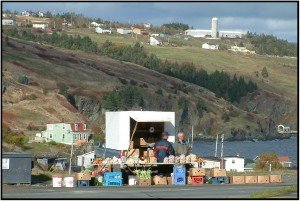I absolutely love food. There are stories in my family that as a toddler I would regularly fall asleep at the table, only to be woken up with my face covered in the contents of my plate. While I have mastered the art of staying conscious at the table, I haven’t yet mastered the challenges of gluttony and indulgence. I have fond memories of trying green peppers for the first time, of an innate desire for the perfect mushroom, and love for all that comes from the ocean, be it shelled or vertebrate.
Being in this beautiful province, I have had much chance to experience all that the sea has to offer. I have had cheeks and tongues, flaps and britches. I have enjoyed fish stewed, fried, poached, baked, smoked and barbecued. In all this I rejoice, as the succulent tastes and aromas make sharing a meal a mystical and spiritual experience.
In all this joy, at times I reflect upon the challenges of contemporary thought concerning my passion. I read of the challenges that Alisa Smith and J.B. MacKinnon offered not long ago in their book, The 100-Mile Diet: A Year of Local Eating. In this I lament, because it is quite hard for us in this province to be strict adherents. I lament because we have a local farmer’s market, http://stjohnsfarmersmarket.org/ open only from June to December each year, and without the volume to sustain even 20% of the local population. I lament that the local grocery stores ship in produce from across the globe, thus increasing the carbon footprint, and lessening the freshness of the produce. I lament because if all ferries and flights were cancelled, (as happens periodically due to weather) we would have less than one week’s supply of food for this population.
I don’t pretend to understand the complexities of economics, world trade, and the need for diversified food sources, yet I can’t help but notice that if I were strict with a hundred mile diet, I would have a different life:
- No sugars, rice and flours
- Fresh fruits and vegetables five months of the year
- Limited poultry and beef intake
- No coffee
- An abundance of fish, caribou, moose and rabbit
In reading some national church publications, I came across the 2007 document, Just Living, produced by the Partnerships and EcoJustice Committee of General Synod. It speaks of the many challenges of justice and ecology that face the church this day, and how the local parish setting can be an opportunity for us as Anglicans to learn, reflect, face and change our approaches. These changes may assist to lessen carbon footprints and emphasize Trade Justice in the local and international context. I am comforted by their approach, as they state:
The Partnerships department of The Anglican Church of Canada
offers Just Living as a starting point for parishes to consider and
make choices about the challenges of economic justice and the
ecological crisis of climate change. Economy and ecology share the
same Greek root oikos, which means “household”. Economy has to
do with the rules for running the household, while ecology is about
the underlying principles, the spirit of the household. Our present
world economy contributes much to the impoverishment of family
households in every country, and puts our local and global ecologies
at the greatest possible risk.” (Just Living, p. 5)
There is no doubt that a close examination of this booklet by our parish will challenge us to adapt our patterns so as to lessen the impact of injustice in the world.
I don’t think we can stop there. I am reminded that our footprint in Newfoundland and Labrador at this time is greatly shaped by our recent affluence due to the presence of oil off our coast. In multifaith conversations in this area, we have been speaking about the justice of oil. The resources we have from Hibernia and Terra Nova platforms offer so much to the residents of Newfoundland and Labrador, yet the bulk of the revenue (over 80%) does not stay within the province. In fact, all the oil is shipped away for processing, causing a greater carbon footprint, as oil products (gasoline, fuels, etc.) are both consumed in the transport, and shipped here from other locations for our use. How wasteful is it for us to harvest oil on one side, for transport to other locations for processing, while importing oil and gas from other places?
It seems as though in our oikos, we need to examine all that’s involved. We need to be fair to those residing within our province, as well as those who would benefit from it. We need to take stock of our resources, and use them to the best of our ability, while lessening the exploitation of the environment with which we’ve been charged as stewards. This may mean finding new ways of trade and economy in our place, and may cause a change in our diet as well.
Perhaps I will once again fall asleep in my food after so much pondering … perhaps not. More likely, it will be rabbit and fish rather than green peppers and mushrooms, if I am to make an impact in the world around me.

